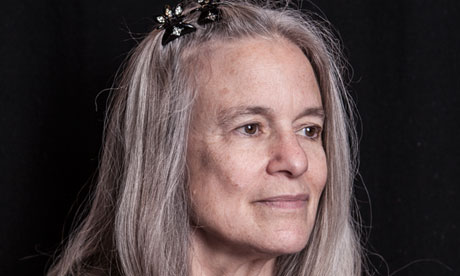Books |
Sharon Olds: Stag’s Leap
By
Published: Sep 12, 2016
Category:
Poetry
In 2012, Sharon Olds won the T.S. Eliot Prize for this book. Then she won the Pulitzer. Now she’s won the Wallace Stevens award, which isn’t small — in addition to the honor, there’s a check for $100,000. There’s nothing left for her to win — except you, as a reader.
When a marriage goes wrong, the story comes down to this: You are no longer loved. After years of intimacy, unloved.
The emotions of a marriage that ended when you didn’t want it to are written in blood in the 49 poems in “Stag’s Leap.” If you’ve read Sharon Olds — and I’ve encouraged you to read Strike Sparks — you know that politics and poetics are not her topic. She is. And this time, she has an epic event to write about.
When she was 55 and had been married for 32 years, her husband announced that he had fallen in love with another woman and was leaving her. That was devastating for Olds — she had often written about her marriage, and for those who read her poems as a diary, it was passionate and profound. Now, reflexively, she began to write again. She made one promise, and it was to her two adult children: I won’t publish anything for a decade.
Fifteen years later, she published “Stag’s Leap. “ The reference is to her husband’s favorite wine. Equally, that stag jumping off a cliff was a metaphor for her husband’s exit: "When anyone escapes, my heart/ leaps up. Even when it’s I who am escaped from/ I am half on the side of the leaver."
Those lines set a tone. She’s not sticking pins in her husband’s back and muttering voodoo – she is coming to terms, she is working to see how they have both gone wrong, how she has been a partner in this. Even in “The Last Hour,” when you expect self-control to be lost:
Suddenly, the last hour
before he took me to the airport, he stood up,
bumping the table, and took a step
toward me, and like a figure in an early
science fiction movie he leaned
forward and down, and opened an arm,
knocking my breast, and he tried to take some
hold of me, I stood and we stumbled,
and then we stood, around our core, his
hoarse cry of awe, at the center,
at the end, of our life.
When Olds won the Eliot Prize, Britain’s Poet Laureate Carol Ann Duffy, chair of the judging panel, said: "This was the book of her career. There is a grace and chivalry in her grief that marks her out as being a world-class poet. I always say that poetry is the music of being human, and in this book she is really singing. Her journey from grief to healing is so beautifully executed." [To buy the paperback of “Stag’s Leap” from Amazon, click here. For the Kindle edition, click here.]
Olds is eloquent about what she learned in the writing of these poems:
We’d had a lot of good years; then our lives slowly changed, our characters changed, and we were not so well suited to each other anymore. He just realized it long before me. As I began to be able to see some of what happened (not all) from his point of view—his wish to be with someone more like himself, someone not a writer—then I didn’t feel like a victim but more like an equal. As one of the poems in “Stag’s Leap” says: “50/50 we made the marriage/ 50/50 its demise."
Or, as she writes in the final lines of the last poem: "I did not leave him, he did not leave me, I freed him, he freed me.”
Long ago, Sharon Olds said, “I want a poem to be useful.” For anyone in a failing or failed relationship, these poems are nothing less than a lifesaver, a revelation, a cleanser — a short cut to a clearer future.


